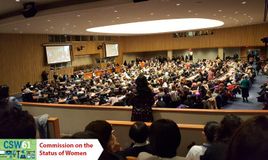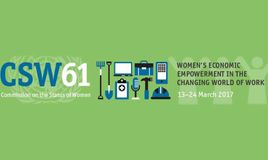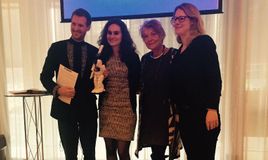Adoption Agreed Conclusions CSW61

Women’s rights advocates have seen their hard work pay off as the UN 61st Commission on the Status of Women (CSW61) adopted a set of Agreed Conclusions that made significant commitments to advance women’s rights and economic empowerment in the changing world of work. CSW61, the 61st session of the UN Commission on the Status of Women took place in New York City between 14 and 24 March. During these two weeks, delegations of all UN Member States gathered at the UN headquarters to discuss gender equality and the advancement of women’s human rights.
In cooperation with partner organisations WO=MEN and the Dutch Women’s Council (NVR), Atria was responsible for the coordination of the input of Dutch civil society to the Dutch governmental delegation negotiating on behalf of the Netherlands in New York. This included drafting a set of recommendations relating to this year’s priority theme – The Economic Empowerment of Women in a Changing World of Work – prior to the start of negotiations, as well as a coordinating role on the ground in New York during CSW61. Representing Atria were Director prof. dr. Renée Römkens, Deputy Director Antia Wiersma and Policy Officer Lisanne Post. They followed the negotiations closely and advised the Dutch delegation where necessary or requested with regards to the outcome document. CSW61’s Agreed Conclusions were finally adopted on Friday 24 March 2017 and incorporate some major wins for women’s rights advocates and progressively-minded countries.
You win some…
In line with the Dutch civil society recommendations, that in great deal focussed on the upcoming Fourth Revolution and digital innovations and the impact thereof on the gender gap in the global labour market, the Agreed Conclusions emphasise the importance of access for women and girls to education and work in the emerging STEM (Science, Technology, Engineering and Mathematics) and ICT sectors and countering occupational segregation. The prevalence of gender stereotypes in both education and the media in this context was problematised by the Commission, and identified as another obstacle for countries to overcome in order for women to become economically active and independent in all sectors.
Related to these gender roles, the Commission recognised that women continue to shoulder the bulk of unpaid care and domestic work, and established a blueprint for governments to reduce and redistribute this work through public services, labour and social protections, and affordable child and other care services.. The Commission also recognised the role of trade unions, collective bargaining and social dialogue in addressing economic inequalities and the importance of strong, global labour standards that protect women’s rights in the world of work. Like the Dutch priority document, the Agreed Conclusions also put a lot of emphasis on the rights of women migrant workers and the effect of as well as role of women in the mitigation of the effects of climate change.
In other wins, the Commission urged governments to end violence and harassment against women in the world of work, with a specific focus on strengthening and enforcing laws and policies and developing measures to promote the re-entry of victims and survivors of violence into the labour market. It also recognised that sexual and reproductive health and rights is essential for women’s economic rights, independence and empowerment. Language on families was also constructive in that it implied the reality of a diverse range of family structures. This is an especially hard-fought gain, as the pro-family lobby has been particularly strong at the UN in recent years.
You lose some…
Despite these advances, the Agreed Conclusions – being a compromise text – also include some more regressive elements. While the final ‘r’ in SRHR (Sexual reproductive Health and Rights) this year did not fall off, again comprehensive sexuality education did not make it into the text and reference to the right to safe and legal abortion seemed to be out of the question. And while a more inclusive non-binary view on families has been incorporated, reference to sexual orientation and gender identity has not been achieved. In general, women’s rights activists remain frustrated about the Commission’s recalcitrance to name specific groups of women who are marginalised in throughout the world, whether because of race, ethnicity, caste, class, disability, age, HIV status, sexual orientation, gender identity, gender expression or sex characteristics
Furthermore, women’s rights activists continue to express their vexation that governments are unwilling to fundamentally change the global economic, financial and trade structures that exacerbate inequalities within and between countries or to address the harmful impacts of globalisation that result in the exploitation of women workers. A problematic element related to this, are the sovereignty clauses that some more regressive countries have managed to add, which i.a. refer to the importance of national realities and policy space in the gender-responsive implementation of the 2030 Agenda for Sustainable Development.
Finally, the limited reference to civil society, and the contribution and protection of women’s organisations and women human rights defenders is problematic. At a time when women’s human rights are under attack globally, international spaces become all the more important. In this context, women’s rights activists present at CSW61 were outraged by the attempts to remove them from the UN Headquarters during late-night negotiations. Whether this was an attempt to limit their influence and marginalise their voice remains unclear, but that was the outcome of the act. Over 700 organisations endorsed a protest letter within a 20 hour window, which resulted in their restored access.
This blogpost is written by Lisanne Post, policy advisor Atria. She is attending CSW61.




